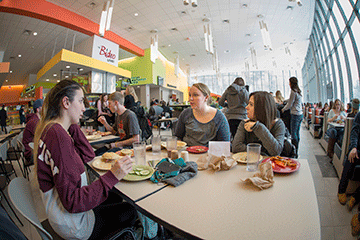
10/20/2015
By now the hand key access system added this semester to let students into food service areas of the College’s two large all-you-care-to-eat dining halls has become a familiar aspect of campus life.
But with the start of the flu season have come extra measures to prevent the spread of germs among those who must use this theft-prevention device.
Students entering Neubig Hall’s Neubig Dining and the Student Life Center’s Bistro now present their ID cards to a cashier and press their palms to a flat surface, which compares hand dimensions to a record that each meal plan participant set up at the start of the semester.
The device does not record fingerprints, merely the shape of the hand, which it converts to a number associated with the meal plan holder. Students have used the new system to reduce the time needed to sink their teeth into that salad, sandwich or slice of pizza.
With the return of colder weather, rain and snow, ASC has taken steps in response to several recent inquiries from students and staff about the infection potential of the hand key access systems:
- First, hand sanitizer is provided near each hand key station.
- Also, sinks are available in both Neubig Dining and the Bistro. Students and staff are encouraged to wash their hands upon entering the dining hall.
- Finally, plastic gloves are present at each hand key station. Students and staff are free to place a glove on the hand before using the hand key to avoid direct contact with the surface of the device. The gloves do not prevent the device from confirming identity and granting access to the dining hall.
The new equipment and a few other changes were needed because last year some students shared ID cards to let their friends eat for free.
“It’s about making sure the person presenting the card is the person who paid for the meal,” said Pierre Gagnon, ASC executive director. “You can’t tell from the ID card pictures reliably.”
Gagnon noted that the identification equipment — like other commonly touched objects — does present some risk for the transmission of colds, flu and other communicable diseases.
He noted that while such concerns are understandable, a 2007 study conducted at Purdue University found that the bacterial survival and transferability associated with hand key access devices are no greater than one would find on a door knob or other contact surface.
In fact, the area where students touch is impregnated with silver by the manufacturer to reduce the risk of infection, he noted.
“We are all aware that during this time of year the best way to prevent the spread of disease is through good hygiene, including thorough and frequent hand washing,” he said. “Taking advantage of these options will help to ensure the continued good health and well-being of our campus community.”